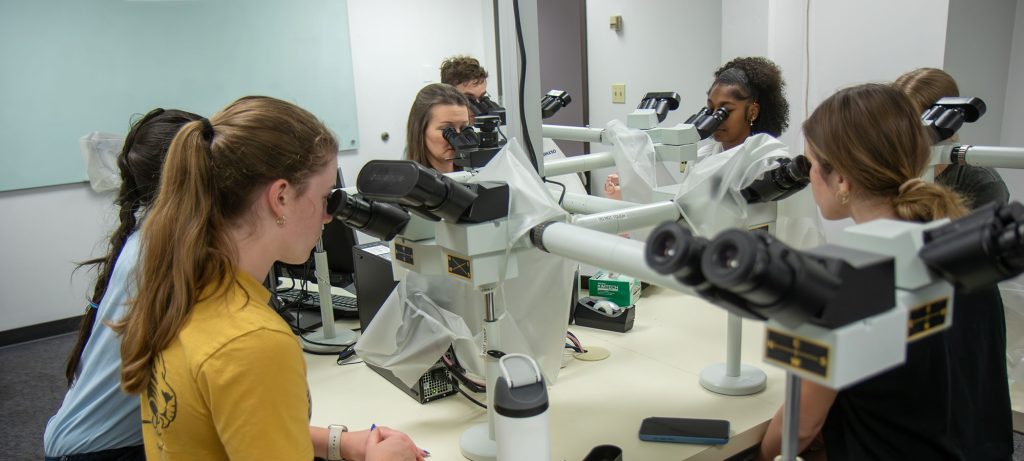The University of Missouri Veterinary Medical Diagnostic Laboratory, within the Department of Veterinary Pathobiology, offers a 3-year clinical pathology residency with the option of concurrent enrollment in a master’s degree program. One candidate is accepted annually. Residents work closely with four full-time faculty members and a team of laboratory professionals.

Current Faculty Members
- Angela Royal, DVM, MS, DACVP (residency coordinator)
- Tamara Hancock, DVM, MS, PhD, DACVP
- Michelle DeCourcey, DVM, MS, DACVP
- Sidney Bogue, DVM, MEd, DACVP
Current Residents
- 3rd year – Jacqui Nunnelley, DVM
- 2nd year – Elizabeth Browder, DVM
- 1st year – Madison Knight, DVM
Residency Structure and Highlights
Our residency program provides broad training across all major topics in clinical pathology, preparing trainees both for board certification and for careers in any sector of clinical pathology. Quarterly meetings with the residency coordinator allow residents to consistently receive feedback on their performance, provide feedback about the training program, set reasonable goals, and celebrate milestones as they are achieved.
Graduate degree options: Residents can complete a non-thesis Master of Science degree or a Master of Education degree concurrent with residency training, or they may complete residency without enrolling in a graduate degree program. Residents enrolled in graduate degree programs receive tuition assistance from the University, and their schedules are tailored to accommodate graduate courses and research activities. Two of our faculty members have advanced degrees in education, and all have strong interests in teaching. We are proud to offer the MEd option for trainees who intend to become educators.
Diagnostic microscopy caseload: We receive a combination of mail-in diagnostic lab samples and internal Veterinary Health Center samples, providing a wide variety and high volume of diagnostic microscopy case material. We average approximately 27 cytology cases per day (excluding CBC/blood smear reviews and urine sediment reviews). Residents are expected to be fully on clinics (with faculty support) for one week per month, and they select additional partial days to provide diagnostic support while others are on clinics.
Graduate courses and rounds: Typically, all of our faculty members and residents attend multiple rounds together each week. These are a great way to provide intentional training to round out core knowledge for our trainees, and consistent group participation helps foster a strong team dynamic in our group. Examples of available rounds and graduate courses include:
- Chemistry case rounds
- Journal club
- Weekly cytology rounds for students and house officers
- Topic-based cytology rounds
- Cytology-histopathology correlates
- Hematology/bone marrow rounds
- Image review
- QA rounds
- Phase I board exam preparatory course
- Advanced Clinical Pathology (graduate course for all CVM house officers)
- Specialty histopathology rounds: Ocular pathology, dermatopathology, neuropathology
Teaching: Residents are expected to participate in veterinary student instruction at the clinical level and to a small extent the pre-clinical level. Our three residents take charge of the “techniques” based portion of veterinary student clinical pathology rotations, teaching small groups (10 students) how to perform urinalyses, prepare blood films, maintain and utilize in-clinic laboratory analyzers, and more in approximately 2 hour daily segments over 2.5 weeks. While on clinics in the lab, residents will also review daily cytology and hematology cases with elective students and visiting house officers as schedules align. Pre-clinical instruction includes leading one laboratory session for the 2nd year clinical pathology course and assisting students during the all laboratory sessions. Our clinical pathology group carries a strong interest in education and training educators. For interested trainees, additional opportunities exist to gain further teaching experience at all levels of instruction and through varied modalities. This could include preparing 1-2 didactic course lectures, creating or revising clinical teaching activities, instructing one or more segments of online courses geared towards veterinary technicians or veterinarians, preparing CE material for veterinarians or veterinary technicians, or preparing internal instructional material for our laboratory staff and student technicians.
Scholarly activities: All residents are encouraged to submit material for presentation at conferences annually. Professional development funds are provided to allow travel to at least one conference per year. Our faculty mentor residents through submission of at least one journal manuscript during their program, whether relating to a resident’s graduate research, pertaining to other laboratory research, or highlighting a unique diagnostic case.
For more information, see the program description at the ACVP training program page. Feel free to contact the residency director, Angela Royal, with any questions at royalab@missouri.edu.
